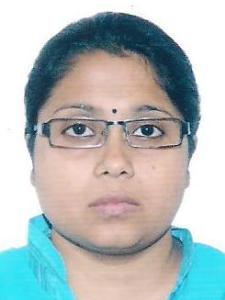
Sanhita M. answered • 05/17/16
Tutor
4.7
(11)
Mathematics and Geology
Let's assume Jenny's glass holds x ml of liquid
Thus Kevin's glass holds 2x ml of liquid
Jenny's glass holds (x/3) ml of chocolate syrup and (2x/3) ml of milk
Kevin's glass has ( 2x/4) 0r (x/2) ml of milk and (2x/3) ml of chocolate syrup
The combination of mixtures in the pitcher contains [(x/3)+(2x/3)] ml of chocolate syrup from respective glasses of Jenny and Kevin = x ml of chocolate syrup
while the volume of combination is [(x/3)+(2x/3)] of chocolate syrup + (2x/3) ml of milk from Jenny's glass +(x/2) ml of milk from Kevin's glass ={ x+[(4x+3x)/6] } ml = { x+ (7x/6)} ml = (13x/6) ml
Hence x ml of (13x/6) ml is chocolate syrup thus (6/13) part of combined mixture will be syrup, or in every 13 ml or any unit of combined mixture 6 part will be syrup
Note: since it has not been mentioned how much syrup Kevin added to his one fourth of a glass of milk, I have thought it's one third glass of syrup. Other wise, thinking Kevin added to one fourth glass of milk as much syrup required to create a mixture that is equal in proportion to a mixture with a third of a glass of syrup and two third of glass of milk, it can be as following:
Let's assume Jenny's glass holds x ml of liquid
Thus Kevin's glass holds 2x ml of liquid
Jenny's glass holds (x/3) ml of chocolate syrup and (2x/3) ml of milk
Kevin's glass has ( 2x/4) or (x/2) ml of milk which is 2/3 rd of mixture, thus he must have added (x/4) ml of syrup as (2/3) of the mixture has a volume of (x/2) ml, (1/3) i.e., half of (2/3) or (1/2) of (2/3) of the mixture must have a volume of (1/2) of (x/2) ml or (x/4) ml
The combination of mixtures in the pitcher contains [(x/3)+(x/4)] ml of chocolate syrup from respective glasses of Jenny and Kevin = [(4x+3x)/12]ml of chocolate syrup = (7x/12)ml of chocolate syrup
while the volume of combination is [(x/3)+(x/4)] of chocolate syrup + (2x/3) ml of milk from Jenny's glass +(x/2) ml of milk from Kevin's glass ={ (7x/12)+[(4x+3x)/6] } ml = {(7x/12)+ (7x/6)} ml = (7x+14x/12) ml =(21x/12) ml
Thus Kevin's glass holds 2x ml of liquid
Jenny's glass holds (x/3) ml of chocolate syrup and (2x/3) ml of milk
Kevin's glass has ( 2x/4) or (x/2) ml of milk which is 2/3 rd of mixture, thus he must have added (x/4) ml of syrup as (2/3) of the mixture has a volume of (x/2) ml, (1/3) i.e., half of (2/3) or (1/2) of (2/3) of the mixture must have a volume of (1/2) of (x/2) ml or (x/4) ml
The combination of mixtures in the pitcher contains [(x/3)+(x/4)] ml of chocolate syrup from respective glasses of Jenny and Kevin = [(4x+3x)/12]ml of chocolate syrup = (7x/12)ml of chocolate syrup
while the volume of combination is [(x/3)+(x/4)] of chocolate syrup + (2x/3) ml of milk from Jenny's glass +(x/2) ml of milk from Kevin's glass ={ (7x/12)+[(4x+3x)/6] } ml = {(7x/12)+ (7x/6)} ml = (7x+14x/12) ml =(21x/12) ml
Hence (7x/12) ml of (21x/12) ml is chocolate syrup or (7x/21x) or (1/3) part of combined mixture will be syrup or in every 3 ml or any unit of combined mixture 1 part will be syrup.
Post Script: This editor does not support drawing diagrams.



